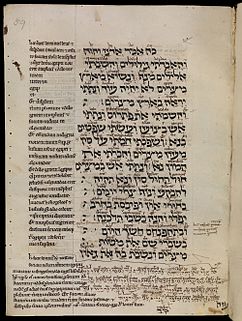
Summary
Ezekiel 2 is the second chapter of the Book of Ezekiel in the Hebrew Bible or the Old Testament of the Christian Bible.[1] This book contains the prophecies attributed to the prophet/priest Ezekiel and is one of the Book of the Prophets.[2] In this chapter, set within a wider section from Ezekiel 1:28b to Ezekiel 3:15, "Ezekiel receives a commission [from God] to go to the 'rebellious house' of Israel" and to speak for God.[3]
| Ezekiel 2 | |
|---|---|
 Book of Ezekiel 30:13–18 in an English manuscript from the early 13th century, MS. Bodl. Or. 62, fol. 59a. A Latin translation appears in the margins with further interlineations above the Hebrew. | |
| Book | Book of Ezekiel |
| Hebrew Bible part | Nevi'im |
| Order in the Hebrew part | 7 |
| Category | Latter Prophets |
| Christian Bible part | Old Testament |
| Order in the Christian part | 26 |
Text edit
The original text was written in the Hebrew language. This chapter is divided into 10 verses.
Textual witnesses edit
Some early manuscripts containing the text of this chapter in Hebrew are of the Masoretic Text, which includes the Codex Cairensis (895), the Petersburg Codex of the Prophets (916), Aleppo Codex (10th century), Codex Leningradensis (1008).[4]
There is also a translation into Koine Greek known as the Septuagint, made in the last few centuries BC. Extant ancient manuscripts of the Septuagint version include Codex Vaticanus (B; B; 4th century), Codex Alexandrinus (A; A; 5th century) and Codex Marchalianus (Q; Q; 6th century).[5][a]
Verse 2 edit
- Then the Spirit entered me when He spoke to me,
- and set me on my feet;
- and I heard Him who spoke to me.[7]
Verse 10 edit
- Then He spread it before me;'
- and there was writing on the inside and on the outside,
- and written on it were lamentations and mourning and woe.[9]
- "On the inside and on the outside": unlike the ordinary scrolls which contain writing on only one side, this scroll was described as full of words on both side, dramatizing the fact that the oracle was given to Ezekiel by God.[10] This may indicate a knowledge of Jeremiah's scrolls (Jeremiah 36:1–4.[10]
See also edit
- Son of man
- Related Bible parts: Jeremiah 1, Ezekiel 1, Ezekiel 3, Zechariah 5, Revelation 5, Revelation 10
Notes edit
- ^ Ezekiel is missing from Codex Sinaiticus.[6]
References edit
- ^ Carley 1974, pp. 20–21.
- ^ Theodore Hiebert et al., 1996. The New Interpreter's Bible: Volume VI. Nashville: Abingdon.
- ^ Galambush 2007, p. 538.
- ^ Würthwein 1995, pp. 35–37.
- ^ Würthwein 1995, pp. 73–74.
- ^ Shepherd, Michael (2018). A Commentary on the Book of the Twelve: The Minor Prophets. Kregel Exegetical Library. Kregel Academic. p. 13. ISBN 978-0825444593.
- ^ Ezekiel 2:2 KJV
- ^ Coogan 2007, p. 1184.
- ^ Ezekiel 2:10 KJV
- ^ a b Carley 1974, p. 23.
Sources edit
- Carley, Keith W. (1974). The Book of the Prophet Ezekiel. Cambridge Bible Commentaries on the New English Bible (illustrated ed.). Cambridge University Press. ISBN 9780521097550.
- Clements, Ronald E (1996). Ezekiel. Westminster John Knox Press. ISBN 9780664252724.
- Coogan, Michael David (2007). Coogan, Michael David; Brettler, Marc Zvi; Newsom, Carol Ann; Perkins, Pheme (eds.). The New Oxford Annotated Bible with the Apocryphal/Deuterocanonical Books: New Revised Standard Version, Issue 48 (Augmented 3rd ed.). Oxford University Press. ISBN 9780195288810.
- Galambush, J. (2007). "25. Ezekiel". In Barton, John; Muddiman, John (eds.). The Oxford Bible Commentary (first (paperback) ed.). Oxford University Press. pp. 533–562. ISBN 978-0199277186. Retrieved February 6, 2019.
- Würthwein, Ernst (1995). The Text of the Old Testament. Translated by Rhodes, Erroll F. Grand Rapids, MI: Wm. B. Eerdmans. ISBN 0-8028-0788-7. Retrieved January 26, 2019.
External links edit
Jewish edit
- Ezekiel 2 Masoretic Hebrew with Parallel English
- Ezekiel 2 Hebrew with Rashi's Commentary
Christian edit
- Ezekiel 2 English Translation with Parallel Latin Vulgate Archived 2017-02-26 at the Wayback Machine


